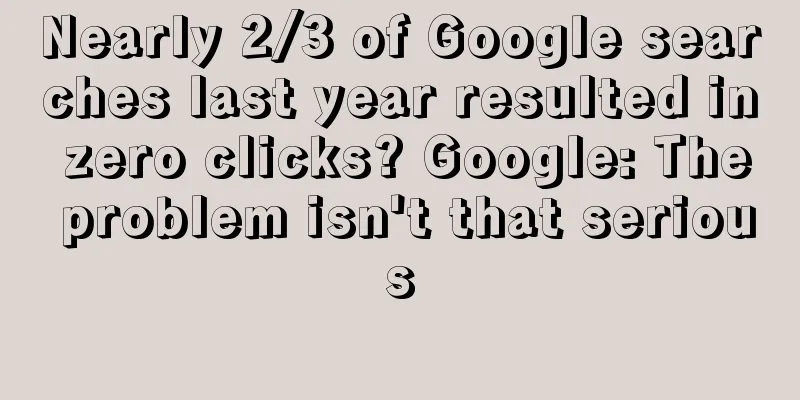Nearly 2/3 of Google searches last year resulted in zero clicks? Google: The problem isn't that serious

|
Remember a few days ago, the editor published an article with reference to foreign media titled "Get everything done without visiting the website? Nearly 2/3 of Google searches in 2020 were "zero clicks"". Today, when surfing the Internet, I found that Google actually made a solemn response to the "rumors" caused by SparkToro's survey data.
At that time, SparkToro founder Rand Fishkin analyzed that "from January to December 2020, 64.82% of all desktop and mobile device searches on Google ended without clicking on any other web media resources, and this number may also underestimate the possibility of some mobile searches and almost all voice searches, so Google's "zero-click searches" may account for more than 2/3." This has caused concern among SEO practitioners. On the one hand, it means that when users use Google search, they are increasingly inclined to directly obtain the information they need through new features such as information panels, featured snippets and videos on the search results page. On the other hand, it means the loss of website traffic and the possibility of Google engaging in monopolistic operations.
However, Google itself is also worried and released an official response to the data on March 24, of course not worried about traffic... pointing out:
"As people across the search industry have pointed out, this claim is based on faulty methodology and misunderstands how people use Google Search. In reality, the websites displayed on Google Search pages receive billions of hits every day. Moreover, Google Search has driven more and more hits to the open web every year since Google was founded."
In addition, Google also believes that the report's description of the concept of "zero-click search" is not detailed enough and cannot provide an accurate description of the real situation. Google also gave a specific example:
“Users don’t always know how to express their search needs accurately when they first start searching. They may start with a broad keyword search, such as “sneakers”, and only realize after viewing the search results that they actually wanted to find “black sneakers”. Previous searches for “sneakers” do not necessarily result in clicks to relevant websites, so in this case, these searches are also considered ‘zero clicks’.”
However, Google did acknowledge that some of the tools it has added inherently reduce referral clicks, such as maps, videos, and flight and hotel booking options.
But overall, Google remains the primary driver of web traffic for many businesses, and as Google search traffic grows, the increase in people searching overall may offset the negative impact of "zero clicks", which would undermine the argument that most clicks do not result in direct business benefits.
But it’s hard to determine the scope of zero-click searches, Google’s ongoing efforts, and the range of results and data presented on Google’s search results pages. It’s also hard to tell whether Google will actually benefit more from search results over time at the expense of referral clicks from other sites.
Therefore, when doing SEO, sellers may consider "zero-click" search as a factor worth considering and conduct more analysis in traffic evaluation. Zero Click |
Recommend
Sellers should keep in mind that you may face these e-commerce frauds in 2021
After the COVID-19 pandemic in 2020 , sellers and...
What is Auto Trader? Auto Trader Review, Features
Auto Trader is the largest digital automotive mar...
North American ports are completely paralyzed! The rate of abandoned containers continues to soar, and 39% of the goods are greatly affected...
For cross-border people, the recent period can be...
The Indian e-commerce market is "booming", and these two giants are in constant competition!
While many people's impression of India is st...
What is Micro Remittance? Micro Remittance Review, Features
Weihuishou is a study abroad remittance product p...
China has become the "big brother" of cross-border consumption, and cross-border consumption is popular in 40 countries and regions
The latest report from the International Post Cor...
What is FBA & FBA Review
FBA stands for Fullfillment By Amazon, and its of...
SHEIN invests 500 million yuan in 5 years to increase supplier empowerment and innovation and continue to support industry upgrading and international expansion
SHEIN has been continuously carrying out supplier...
Dunelm raises profit outlook as sales surge 59%
Dunelm's full-year profit is set to smash Cit...
Amazon's employee turnover could cost it up to $8 billion a year
According to foreign media reports, Amazon's ...
Accounting for 88% of electronic financial payments! Competition among Korean e-commerce platforms intensifies
It is reported that South Korea's large techn...
Known as the "British Amazon", another platform is accelerating its expansion!
During the peak season of cross-border e-commerce...
What is Jet Commerce? Jet Commerce Review, Features
Jet Commerce (JC for short) is a one-stop solutio...
Another company under the top seller goes bankrupt!
Nowadays , the market is still cold, the global c...
A large number of Chinese sellers have been maliciously sued for infringement, and some have won the case!
According to foreign media reports, since last ye...









